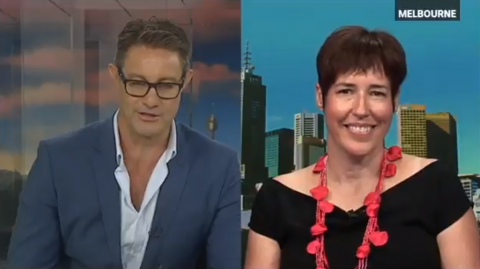
Melbourne Genomics Health Alliance is continuing to share expertise with the wider community, with several experts being invited to appear in the media during recent weeks.
Executive Director Clara Gaff was interviewed on ABC News’ Weekend Breakfast program on 20 January, following comments from Donald Trump’s doctor that the US President was healthy thanks to his ‘good genes’ – despite his reported penchant for burgers and fried chicken.
Clara explained the role genetics plays in health in the live-to-air interview.
‘Genes are involved in affecting how our bodies grow… develop [and] function,’ she said. ‘[Genes] influence health… environment plays a part, [and] it’s the way these [elements] all come together [that defines our health].’
Clara also discussed progress with genomic medicine, explaining that analysis of our genome can now underpin better diagnosis of inherited conditions, as well as provision of more precise and personalised care for patients with cancer.
Earlier, the leader of Melbourne Genomics’ complex neurological and neurodegenerative diseases clinical project, Professor Sam Berkovic, spoke to ABC News about successfully finding the genetic cause of an Australian teenager’s epilepsy through genomic sequencing.
In the interview, aired on Boxing Day, Professor Berkovic explained how Teresa’s seizures were found to be caused by a change in a particular collagen gene. The finding allowed Teresa to be prescribed the correct medication and her epilepsy is now under control.
'We are really excited about the positive impact of genomic sequencing on diagnosis, counselling and even treatment for patients with hitherto unsolved neurological disorders from childhood to adult life,' Professor Berkovic said.
Victorian Health Minister Jill Hennessy commented to ABC NEWS how patients like Teresa could have their lives completely changed by a diagnosis: ‘It fundamentally changes the landscape of diagnosis and treatment, and I am very excited by the potential of this technology,’ she said.
Through Melbourne Genomics’ complex neurological and neurodegenerative diseases clinical project, genomic sequencing is being made available to patients like Teresa.
The project is investigating whether genomic sequencing can provide earlier and more accurate diagnosis of these complex illnesses, potentially reducing medical investigations and the associated burden to patients and families.
Update 1 February: Co-leader of the Alliance's Lymphoma clinical project, Professor Miles Prince appeared on ABC Radio's Conversations with Richard Fidler, explaining how science and technology are joining forces with the human immune system to beat cancer.
Listen to the interview here.
[Image: Associate Professor Clara Gaff on ABC TV Weekend Breakfast]
